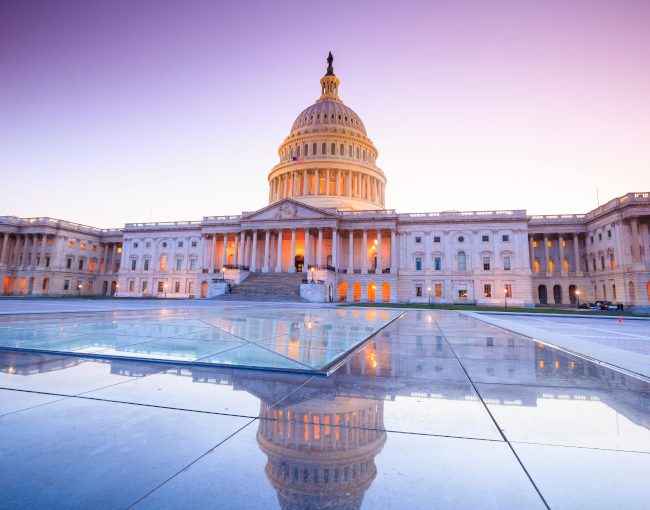The Coronavirus Aid, Relief, and Economic Security Act (“CARES Act”), signed into law on March 27, 2020, provides emergency assistance and health care response for individuals, families and businesses affected by the 2020 coronavirus (“COVID-19”) pandemic. The CARES Act includes several provisions that could provide relief to physicians as a result of the pandemic. We’ve provided a list below of 10 such provisions in the CARES Act that may be of interest to physicians based on the laws and guidance published through April 13, 2020.
1. Paycheck Protection Program (“PPP”) Loan
- Generally. Certain small business are eligible for a partially (and in some cases, fully) forgivable SBA “paycheck protection” loan deployed and originated by private lenders. These loans will be provided on a first come, first served basis.
- Loan details. The maximum loan amount is the lesser of 2.5 times the average total monthly payroll costs or $10 million. The proceeds can be used for certain payroll costs, benefits, insurance premiums, interest payments and rent and utilities.
- Forgiveness. Subject to certain limitations, certain costs incurred during the 8-week period after origination are forgivable.
2. SBA Economic Injury Disaster Loans and Loan Advance (“EIDL”)
- Generally. The CARES Act expands the availability of the SBA’s EIDL’s loans and provides for an emergency grant up to $10,000.
- Loan details. These are lower interest rate loans of up to $2 million. Principal and interest may be deferred at the SBA’s discretion. The loans can be used to pay for expenses that could have been met had the disaster not occurred, including payroll and other operating expenses.
- Emergency grant. If requested, the SBA will distribute an advance on the EIDL loan, of not more than $10,000, which can be used for certain purposes such as maintaining payroll and rent. Businesses are not required to repay any amount of the advance, even if the loan application is subsequently denied.
For a more in-depth overview of these SBA loans, please see Thompson Coburn’s previous coverage here.
3. Payroll tax deferral
- Employers and self-insured individuals can generally defer the employer portion of Social Security taxes required to be paid to the IRS for the period beginning on March 27, 2020, and ending on December 31, 2020, as follows: (i) 50% of the employer portion of any Social Security taxes may be deferred until December 31, 2021, and (ii) the remaining 50% of such taxes may be deferred until December 31, 2022.
- To the extent an employer receives a PPP loan under the CARES Act, the employer may defer deposit and payment of the employer portion of any Social Security taxes so long as such PPP loan has not yet been forgiven. Once a PPP loan is forgiven, an employer may no longer defer any deposits or payments of the employer portion of any Social Security taxes due after the date of such loan forgiveness. The employer portion of any Social Security taxes deferred prior to the forgiveness of the PPP loan are still eligible for deferral.
4. Employee retention tax credit
- Certain eligible employers can receive a payroll tax credit against employment taxes. The employee retention payroll tax credit is generally equal to 50% of the qualifying wages (qualifying wages capped at $10,000) paid to an employee.
- The employee retention payroll tax credit only applies to wages after March 12, 2020. Whether wages paid after March 12 to an employee constitute qualifying wages depends on the number of employees employed by the employer.
- Employers are generally “eligible employers” to the extent such employers conduct a trade or business during 2020 and such employer either (i) was fully or partially suspended due to governmental order, or (ii) experienced a 50% decline in gross receipts during a quarter as compared to the same quarter in 2019.
- To the extent the credit generates a tax refund, the employer can obtain the tax refund by filing IRS Form 7200.
- To the extent the employer receives a PPP loan under the CARES Act, no employee retention payroll tax credit is available.
For a more in-depth overview of the tax provisions from the CARES Act, please see Thompson Coburn’s previous coverage here.
5. Direct financial support from HHS
- Generally. The CARES Act provides $100 billion to reimburse eligible health care providers for health care related expenses or lost revenues attributable to COVID-19 such as costs related to building or construction of temporary structures, leasing of properties, medical supplies and equipment, increased workforce and training, emergency operation centers, retrofitting facilities and surge capacity.
- Payments. CMS has started making $30 billion in direct deposit payments to providers (including payments to physician practices and solo practitioners who are not part of a practice group). Eligible providers will receive a portion of the $30 billion based on such provider’s share of total Medicare FFS reimbursements in 2019. The total FFS payments were approximately $484 billion in 2019. Therefore, providers will be able to estimate their payments based on this total 2019 FFS amount.
6. Medicare advance payments
- Generally. CMS is authorized to provide three months of advance payments during the pandemic to an eligible Medicare provider who submits a request to the appropriate Medicare Administrative Contractor (“MAC”).
- Amount of payment; processing time. Most providers will be able to request up to 100% of the Medicare payment amount for a three-month period. Each MAC will process requests within seven calendar days.
- Repayment and recoupment. Physicians billing under Part B will have 210 days from the date of payment to repay the balance. If the amount is not paid back within 120 days after the date of the payment, CMS will begin automatically recouping payments from newly-submitted claims until the amount is paid in full.
7. Suspension of 2% Medicare sequester.
Medicare payments between May 1, 2020 through December 31, 2020 will not be subject to the 2% Medicare sequestration that has been required under the Budget Control Act of 2011. This will increase payments to physicians during the COVID-19 outbreak. Providers should note, however, in exchange for this temporary suspension, the CARES Act extends the sequestration policy through 2030.
8. Telehealth
- Coverage of telehealth services are relaxed beginning March 6, 2020, through the duration of the pandemic allowing providers to be paid by Medicare for evaluation and management visits, mental health counseling and preventative health screenings through three main avenues: telehealth visits, virtual check-ins and e-visits.
- Even though CMS encourages states and private insurers to also relax telehealth standards during the pandemic, note that the CARES Act only relaxes the telehealth standards from a Medicare payment perspective. Accordingly, the applicable state’s physician licensure laws and applicable payor’s requirements must be taken into consideration as well.
9. Diagnostic tests
Health plans are required to cover all diagnostic tests for COVID-19 (without cost-sharing or prior authorization requirements) if certain conditions are met (e.g., the test is approved by the FDA).
10. Limitation of liability for volunteers
Physicians providing volunteer services in response to the COVID-19 outbreak will not be liable under federal or state law for any harm caused by an act or omission in the provision of health care services during the COVID-19 outbreak if certain requirements are met (e.g., the services are within the professional’s scope of practice).
Nicole Jobe is a partner in Thompson Coburn’s health care group.
Click here to subscribe to News & Insights from Thompson Coburn related to our practices as well as the latest on COVID-19 issues.


















